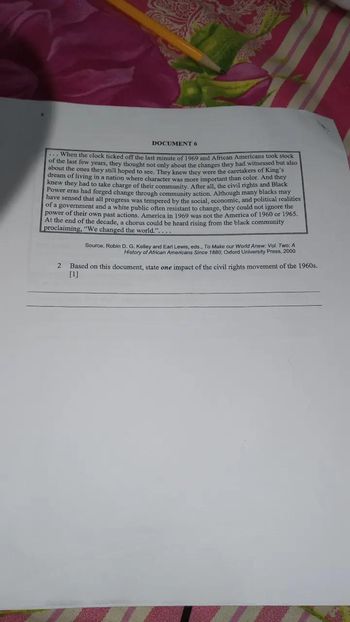Question

Transcribed Image Text:### Document 6 Transcription
---
When the clock ticked off the last minute of 1969 and African Americans took stock of the last few years, they thought not only about the changes they had witnessed but also about the ones they still hoped to see. They knew they were the caretakers of King’s dream of living in a nation where character was more important than color. And they knew they had to take charge of their community. After all, the civil rights and Black Power eras had forged change through community action. Although many blacks may have sensed that all progress was tempered by the social, economic, and political realities of a government and a white public often resistant to change, they could not ignore the power of their own past actions. America in 1969 was not the America of 1960 or 1965. At the end of the decade, a chorus could be heard rising from the black community proclaiming, “We changed the world.”
Source: Robin D. G. Kelley and Earl Lewis, eds., *To Make our World Anew: Vol. Two: A History of African Americans Since 1880,* Oxford University Press, 2000.
2. Based on this document, state **one** impact of the civil rights movement of the 1960s.
---
**Explanation:**
This document is a reflection on the changes and impacts brought about by the civil rights and Black Power movements by the end of the 1960s. It highlights the shift in African Americans' roles and perceptions in society, emphasizing the importance of community action and resilience against social, economic, and political resistance.
There are no graphs or diagrams included in this document. The content focuses solely on textual analysis and comprehension.
The text concludes with an open-ended question for the reader to reflect on the impact of the civil rights movement of the 1960s, encouraging critical thinking and personal interpretation based on the provided source.
![### Document 5
The direct action protests of the 1960s paid dividends. In 1964 and 1965, the Johnson administration orchestrated the passing of the two most significant civil rights bills since Reconstruction. The Birmingham protests and the March on Washington had convinced President Kennedy to forge ahead with a civil rights bill in 1963. But his assassination on November 22, 1963, left the passage of the bill in question. President Johnson, who to that point had an unfavorable record concerning civil rights, had come to believe in the importance of federal protection for African Americans and deftly tied the civil rights bill to the memory of Kennedy.
Despite the passage of this far-reaching bill, African Americans still faced barriers to their right to vote. While the Civil Rights Act of 1964 addressed voting rights, it did not eliminate many of the tactics recalcitrant [stubborn] southerners used to keep blacks from the polls, such as violence, economic intimidation, and literacy tests. But the Freedom Summer protests in Mississippi and the Selma-to-Montgomery march the following year led to the passage of the Voting Rights Act of 1965. Johnson had already begun work on a bill before the Selma march, and he again urged Congress to pass it. On March 15, 1965, he addressed both houses of Congress.
*Source: Henry Louis Gates Jr., Life Upon These Shores: Looking at African American History 1513-2008, Alfred A. Knopf, 2011*
---
### 1. Question
**1. According to Henry Louis Gates Jr., what was one result of the 1960s civil rights protests?**
[1]
______](https://content.bartleby.com/qna-images/question/7b6008a5-dc88-4537-b396-0bb984692515/f69f032d-283b-4759-9310-9cc7d16542d5/8lc3xyp_thumbnail.jpeg)
Transcribed Image Text:### Document 5
The direct action protests of the 1960s paid dividends. In 1964 and 1965, the Johnson administration orchestrated the passing of the two most significant civil rights bills since Reconstruction. The Birmingham protests and the March on Washington had convinced President Kennedy to forge ahead with a civil rights bill in 1963. But his assassination on November 22, 1963, left the passage of the bill in question. President Johnson, who to that point had an unfavorable record concerning civil rights, had come to believe in the importance of federal protection for African Americans and deftly tied the civil rights bill to the memory of Kennedy.
Despite the passage of this far-reaching bill, African Americans still faced barriers to their right to vote. While the Civil Rights Act of 1964 addressed voting rights, it did not eliminate many of the tactics recalcitrant [stubborn] southerners used to keep blacks from the polls, such as violence, economic intimidation, and literacy tests. But the Freedom Summer protests in Mississippi and the Selma-to-Montgomery march the following year led to the passage of the Voting Rights Act of 1965. Johnson had already begun work on a bill before the Selma march, and he again urged Congress to pass it. On March 15, 1965, he addressed both houses of Congress.
*Source: Henry Louis Gates Jr., Life Upon These Shores: Looking at African American History 1513-2008, Alfred A. Knopf, 2011*
---
### 1. Question
**1. According to Henry Louis Gates Jr., what was one result of the 1960s civil rights protests?**
[1]
______
Expert Solution
This question has been solved!
Explore an expertly crafted, step-by-step solution for a thorough understanding of key concepts.
This is a popular solution
Trending nowThis is a popular solution!
Step by stepSolved in 2 steps
